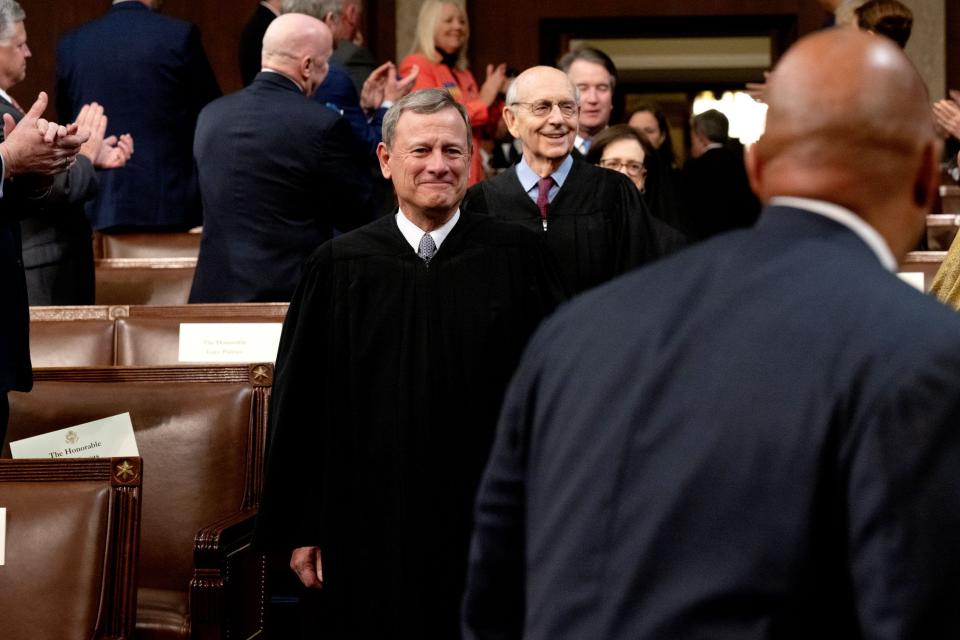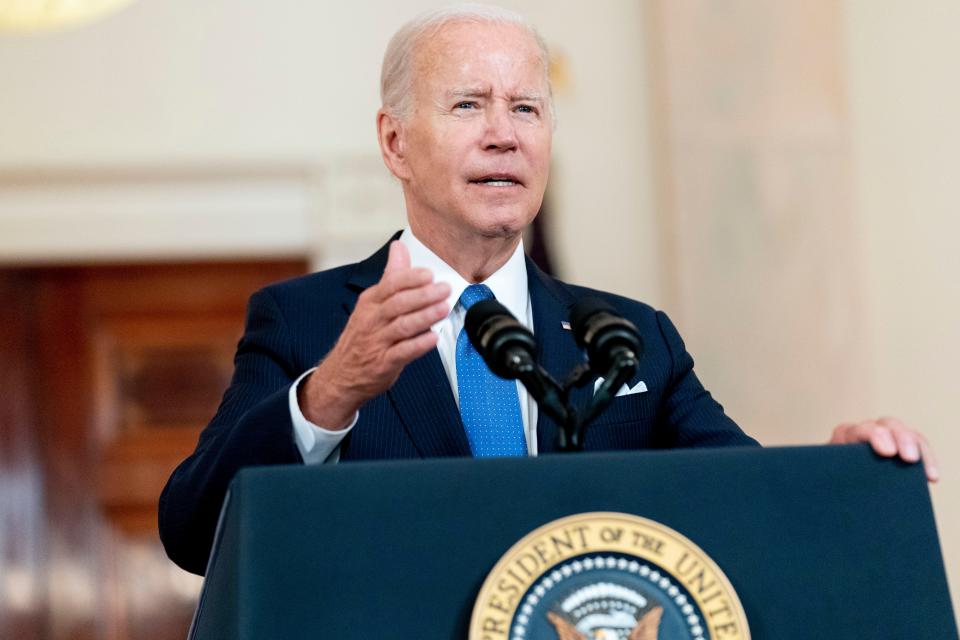What does overturning Roe mean? A breakdown of the Supreme Court's abortion ruling
WASHINGTON – The Supreme Court ruled Friday the Constitution provided no right to abortion, overturning nearly 50 years of precedent and sending the legality of the procedure to state legislatures to determine.
What was the ruling?: The high court ruled the right to end a pregnancy wasn’t found in the text of the Constitution nor the nation’s history.
What does that mean for access to abortion?: Access to abortion could become a patchwork based on where a person lives. In anticipation of the ruling, 26 states are certain or likely to ban abortion, according to a study by the Guttmacher Institute, a research group that supports abortion rights.
How did the nation react?: The most hotly awaited decision of the term sparked a firestorm of reaction. Republicans celebrated after having fought for decades to overturn Roe v. Wade, the landmark 1973 decision that established a constitutional right to abortion. Democrats lamented their lost fight to save it. Officials on each side said the decision would spur voting in the fall elections.
Roe v. Wade overturned: Supreme Court overturns Roe v. Wade, eliminating constitutional right to abortion
Here is what we know about the decision and its implications:

What was the ruling?
At issue was a Mississippi law that banned most abortions after 15 weeks – earlier than permitted under earlier Supreme Court decisions. The high court ruled Friday that the right to end a pregnancy wasn’t found in the text of the Constitution nor the nation’s history.
"Roe was egregiously wrong from the start," Justice Samuel Alito wrote for the majority. "Its reasoning was exceptionally weak, and the decision has had damaging consequences."
'New era' or 'dark day'?: Americans divided as they react to Supreme Court overturning Roe.
How did the justices vote on the Mississippi law?
The court ruled 6-3 along ideological lines to uphold Mississippi’s law.
The six justices in the majority were:
Chief Justice John Roberts
Justice Samuel Alito
Justice Amy Coney Barrett
Justice Brett Kavanaugh
Justice Neil Gorsuch
Justice Clarence Thomas
"It is time to heed the Constitution and return the issue of abortion to the people’s elected representatives," Alito wrote.
The three justices who dissented were:
Justice Stephen Breyer
Justice Sonia Sotomayor
Justice Elena Kagan
"After today, young women will come of age with fewer rights than their mothers and grandmothers had," Breyer wrote in the dissent. "The majority accomplishes that result without so much as considering how women have relied on the right to choose or what it means to take that right away."
What happens now that Roe is overturned?: Supreme Court ruling triggers maze of state abortion laws
Who voted to overturn Roe v. Wade? How Supreme Court justices voted
The court voted 5-4 to overturn Roe v. Wade, with Roberts switching sides. Roberts filed a separate opinion that agreed with Alito on the Mississippi law but argued the high court should not have decided the broader question of whether the Constitution protects abortion at all.
“I would take a more measured course,” Roberts wrote.
The five justices in the majority to overturn Roe were:
Alito
Coney Barrett
Kavanaugh
Gorsuch
Thomas
The four justices who dissented were:
Roberts
Breyer
Sotomayor
Kagan
Roberts disagreed with Roe's focus on viability, marking at what stage a fetus could survive outside the womb. But he said that was no reason to overturn Roe entirely.
"None of this, however, requires that we also take the dramatic step of altogether eliminating the abortion right first recognized in Roe," Roberts wrote. "Mississippi itself previously argued as much to this Court in this litigation."
Can I still buy Plan B?: Where can I get it? What to know after SCOTUS overturns Roe v. Wade

What was the Dobbs case?
The Jackson Women’s Health Organization, the last abortion clinic in Mississippi, challenged a state law in 2018 that banned most abortions after 15 weeks.
The clinic sued Thomas Dobbs, the state health officer of the Mississippi Health Department named to defend the state law, by arguing the state law conflicted with the court’s Roe v. Wade decision from 1973, which found a constitutional right to abortion and upheld in Planned Parenthood v. Casey from 1992.
A pair of lower courts agreed with the clinic, but Mississippi appealed, asking the Supreme Court to uphold its ban and do away with the constitutional right to abortion altogether.
Where is abortion legal in the world?: Canada, other countries allow abortions and these ban them.
What are the broader implications of overturning Roe?
Access to abortion will now depend on where a person lives.
Republican lawmakers are set to ban abortion in about half the states while Democratic-led states are likely to reinforce protections for the procedure.
"The real-world effects of overruling Roe and Casey would be severe and swift," Solicitor General Elizabeth Prelogar told the court on behalf of the Biden administration.
Former Vice President Mike Pence, a potential candidate for president in 2024, called for ending abortions in all 50 states.
”Having been given this second chance for life, we must not rest and must not relent until the sanctity of life is restored to the center of American law in every state in the land,” Pence said.
Where the abortion fight goes from here: Roe overruled, but the battle will continue

What are the state laws?
States began adopting laws to deal with the decision even before it was handed down.
Nine states, including Alabama, Arizona, Wisconsin and West Virginia, adopted abortion bans before the Supreme Court decided Roe, according to the Guttmacher Institute.
An additional 13 states – Arkansas, Idaho, Kentucky, Louisiana, Mississippi, Missouri, North Dakota, Oklahoma, South Dakota, Tennessee, Texas, Utah and Wyoming – approved "trigger bans" to prohibit the procedure if the ruling turned out as it did. Four of those states have both a pre-Roe ban and a trigger law.
Meanwhile, at least 14 states, including California, New York and Illinois, have approved laws protecting the right to abortion despite the court’s decision.
Abortion laws by state: Searchable database of state-by-state abortion limits and protections

Biden calls overturning overturning of Roe v. Wade 'a sad day for the country'
President Joe Biden said he was stunned by the ruling, but he called on Congress to protect access to abortion and on voters to support protections for abortion in November elections.
“It just stuns me,” Biden said of the decision. “This is a sad day for the country in my view but it does not mean the fight is over.”
He urged protests to be conducted peacefully and said violence is never acceptable. He added that "this fall, Roe is on the ballot."
“This decision must not be the final word,” Biden said.
Midterm elections: Furor over Roe v. Wade reversal likely won't rescue Democrats in midterm elections: Poll

What was the reaction in Congress?
House Republican leaders called the decision a victory for decades of advocacy for preserving life.
“Every unborn child is precious, extraordinary and worthy of protection,” said the joint statement from House Minority Leader Kevin McCarthy of California, Whip Steve Scalise of Louisiana and Conference Chair Elise Stefanik of New York. “We applaud this historic ruling, which will save countless lives.”
Democrats said women’s rights would be on the ballot in November. House Speaker Nancy Pelosi, D-Calif., accused Republicans of charging ahead with plans to criminalize health care. “This cruel ruling is outrageous and heart-wrenching,” Pelosi said.
Senate Majority Leader Chuck Schumer, D-N.Y., said the rights of millions of women were taken away by five unelected justices.
“Today is one of the darkest days our country has ever seen,” Schumer said.
Anti-abortion advocates: The Supreme Court overturning Roe v. Wade is only the beginning for anti-abortion advocates

What does Clarence Thomas and the 14th Amendment have to do with the Roe decision?
Thomas wrote an opinion agreeing with Alito and going further by inviting challenges to precedents providing for gay marriage and access to contraceptives.
Thomas called it “farcical” that the 14th Amendment created a right to abortion by guaranteeing that states can’t “deprive any person of life, liberty, or property without due process of law." He invited challenges to other cases decided based on due process as “demonstrably erroneous.”
He cited Griswold v. Connecticut providing a right for married persons to have contraceptives, Lawrence v. Texas providing a right to private, consensual sex acts and Obergefell v. Hodges providing a right to same-sex marriage.
“After overruling these demonstrably erroneous decisions, the question would remain whether other constitutional provisions guarantee the myriad rights that our substantive due process cases have generated,” Thomas wrote.
Roe v. Wade: Clarence Thomas calls for Supreme Court to 'reconsider' gay marriage, contraception after Roe v. Wade falls
This article originally appeared on USA TODAY: Roe v. Wade being overturned explained. A breakdown of abortion ruling
